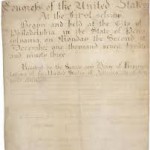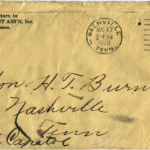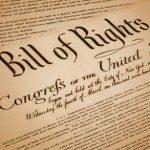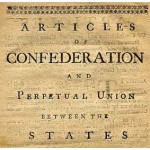The Supreme Court interprets the Constitution. If the Court makes an unpopular decision, the recourse is an amendment. This happened with the Eleventh Amendment. During the Revolutionary War a South Carolina merchant, Captain Robert Farquhar sold supplies to the State of Georgia on credit. Following the War, Georgia refused to pay Farquhar asserting that he […]
Constitution’s Origination Clause: Why Revenue Bills Start in the House, Part 3
Part 1 examined the history and purpose of the US Constitution‘s Origination Clause. Part 2 introduced the Senate practice of “gut and replace” that pretends to comply with the Origination Clause. This article explains why “gut and replace” violates the Constitution.[1] The Origination Clause provides that laws for raising revenue[2] must have started in the […]
Courageous NSA Ruling by Judge Leon Respects Privacy and Fourth Amendment
On December 16, 2013 US District Court Judge Richard Leon took on arguments[1] that over the years have been used to expand government intrusion into American life in ways that would have left James Madison “aghast”.[2] His opinion in Klayman v. Obama finds much of the National Security Agency’s (NSA) surveillance collection of “telephony metadata” […]
An Agency Theory of The Constitution as a Power of Attorney
“[W]e must never forget that it is a constitution we are expounding.” Chief Justice John Marshall, McCulloch v. Maryland (1819) Reviewing the 200 years of “expounding” the Constitution has undergone can be quite confounding. There have been hundreds of Supreme Court opinions. Legal scholars, lawyers, and judges engage in continuing debate over the proper method […]
Fourth Amendment Origins: Court Battles Lead to Revolution
“The house of every one is to him as his castle and fortress, as well for his defence against injury and violence as for his repose.” Sir Edward Coke,[1] 1604 “They who can give up essential liberty to obtain a little temporary safety, deserve neither liberty nor safety.” Benjamin Franklin,[2] 1755 “… one of the most essential branches […]
The Third Amendment to the US Constitution
“Every word of the Constitution decides a question between power and liberty,” James Madison The Constitution’s Third Amendment has never been the controlling law in any case decided by the US Supreme Court, and has been of critical importance in only one appellate case[1] in the nation’s history. It is often ignored and in some […]
A Mom’s Note, A Son’s Vote and the Nineteenth Amendment
Ratification of the Nineteenth Amendment to the US Constitution guaranteed the right to vote for women across the United States. Constitutional studies usually focus on the Supreme Court and its opinions. This approach often loses the personal stories of the real people behind the Constitution’s every word. The tale of Febb Ensminger Burn and her […]
Bill of Rights of the US Constitution: Promise Made, Promise Kept
The first ten amendments to the US Constitution are known collectively as the Bill of Rights. These amendments limit the power of the federal government. By virtue of the 14th Amendment, most government restrictions in the Bill of Rights apply to the states as well. The Constitution was a grant of power to the central […]
Article VII of the US Constitution: Ratification
The Articles of Confederation was the original operating document of the United States. Under the Articles, there was a weak central government with little authority to raise revenue. The Articles were written with the idea that each State was sovereign in its own right and like a little country of its own. Recognizing that each […]
Article V of the US Constitution: Amendments
The Founding Fathers worked hard to come up with a Constitution that would stand the test of time. They had both the foresight and humility to know that with changing times there would be a need to change the charter for the US government. Beyond that, the Declaration of Independence had asserted the People possessed […]















